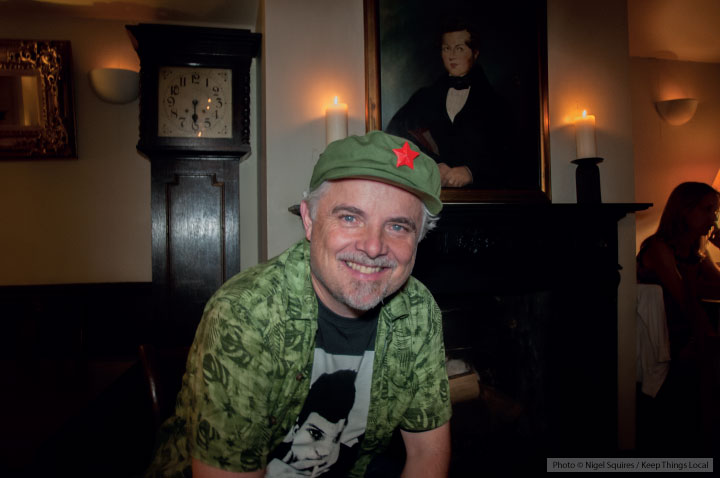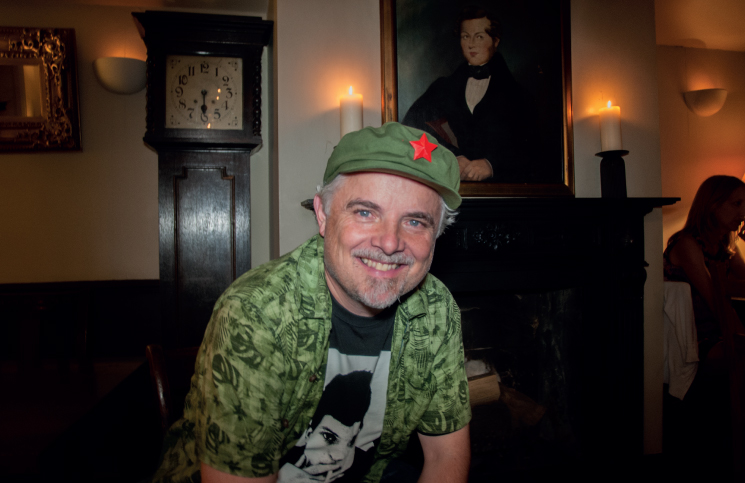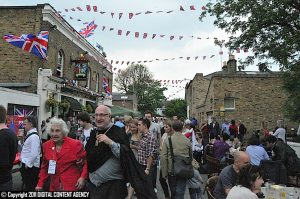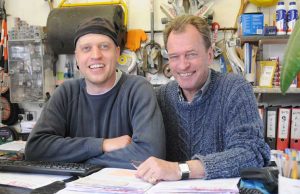Tim Dunn tells Jo Reynolds that he wears two hats in the BBC but would doff his cap to the Queen and armed guerillas.
Did you study history at Oxford in order to make historical programmes for the BBC?
There was no master plan. I got into Oxford, I felt, by accident or mistake. I was convinced they’d got the wrong person. I had no idea what I wanted to do afterwards. I started out in accountancy and I was extremely bad at it. The accountants’ firm did some tests on me which revealed I was in the bottom two percent of the population for suitability for being an accountant – which I thought was a great compliment. I got out and was looking for a job and one day I had a mysterious phone call from a major who wanted to meet me in a hotel. It was all a bit surreptitious. I went into the room and he asked me to sit on the bed and he got a briefcase out and said, I’ve got a job selling storage space. It’s a growth business. I said, I’m not really interested, thanks, and he said, don’t worry, there’s something else that might be of interest to you. I’ve got contacts at the Foreign Office. Then I was interviewed by a colonel – terribly nice. First thing he said was, are you a homosexual? I said, no, and he said, that’s rather good because we’ve had trouble with homosexuals.
So how did you get the job with the BBC?
That was years later. I was over 30 when I started at the BBC. Before then, I did lots of different types of journalism: football, cricket, finance, international news… I applied for the BBC training scheme – I just saw it in the paper and applied on the off chance. I didn’t think I’d get it because I’d been turned down by the BBC dozens of times before. Every interview before had gone horribly wrong so I didn’t think I’d get it. I was very relaxed. It was all day. They tested you on how you interview people, if you had any ideas, how you developed the ideas, did story boards. Luckily, maths didn’t come into it too much.
Do you prefer directing or producing?
It’s the same thing really now. There’s no difference. In television, unlike movies, they don’t differentiate. From the start, in terms of producing, you have to work out how you’re going to spend the money, what the sequences are, then you have to write the script and get all the research done. And then the directing is just the bit in the middle where you’re away for a week or two filming it. You even do the camerawork these days. And sound. And then you come back into the edit and you’re in the edit the whole way through so it’s all the same job.
Due to budget constraints?
Partly because budgets have got tighter and tighter, but it’s also new technology. You can hire a good camera at a good price that’s relatively easy to use. Sometimes it makes sense to just do something on your own and then you spend the money on getting specialist equipment or working with a really good crew. You make a choice: how much you film yourself and how much you spend on getting a really good cameraman in. It depends on the scale of the project because there’s a big difference between something for BBC1 and something for BBC 4, where you probably will have to film more yourself because it’s a smaller channel but they’re often more enjoyable because they’re more challenging. For me, the most important thing is for the money to be on the screen.
What TV programmes do you love?
I love the ‘Fast Show’. That wonderful collection of off the wall characters was absolutely brilliant. That’s my favourite comedy. I love the whacky sense of humour. It’s very British. Favourite drama? ‘Breaking Bad’ was an incredible script, superbly acted and superbly shot. And I was really impressed by ‘Children of Syria’. It followed six children from six different backgrounds, each bright and charming, but each saying they had no future. Lyse Doucet was so connected to the children. You could tell she really cared.

Is documentary a better way of explaining historical events than dramatic reconstruction?
Documentary suits some types of subject matter and drama others. You couldn’t afford to tell all the stories you want through drama because it’s so expensive. There are certain stories sprawling over a wider period of time where you need more context and explanation, they suit a documentary.
Do all directors really want to direct Hollywood movies?
There are a lot of people who do factual programmes who maybe want to move on to drama but I don’t see drama as the pinnacle. I think documentary in its own right is a really important art form. You can see from the success of recent documentaries in the cinema, like ‘Senna’, which was absolutely fantastic. And ‘Touching The Void’, and ‘Man On Wire’. All of those documentaries show what you can do with a bit of imagination. In television, at the moment we’re in a period of the presenter, where virtually every programme needs one or more presenters. Ten years ago, that was relatively new and that will change again. Presenters give you a lot of opportunities to tell stories in a straight forward way because you just go to a location with them, with a script, and they can do a piece to camera and tell you about things.
Who is your favourite presenter?
My favourite presenter at the moment is Mary Beard, the reason being that she knows her stuff and she presents it with such humanity and vitality. She’s just herself, which is the most difficult thing to be because a lot of people try to be what other people might expect them to be rather than just being themselves and that’s all I ask of a presenter.
Are modern presenters obliged to be a real character as well as an expert?
You have to have a certain personality to come over on camera. And some people that you meet, you think they’d be great, but then you turn the camera on and they don’t have that same magic. I’ve been working with Dan Cruickshank and he’s great because he has an infectious enthusiasm, he knows his subject inside out and it’s a pleasure travelling with him because you learn so much. Audiences love him. Another presenter I work with a lot is Alastair Sooke, who’s a delight because his enthusiasm for his subject is endless. The BBC is always trying to find younger presenters because one of the challenges for the BBC is the average age is relatively high, late fifties for the main channels. We need presenters who can attract a younger audience. We need people who bring something different, some diversity, because over the years there has been a tendency for the BBC to use men of a certain age. There’s a place for them of course but finding young presenters with something fresh to say is the Holy Grail.
Could you be a presenter?
Some of my colleagues have gone to the other side – Michael Mosley and Alan Yentob – and it can work because they understand what’s necessary, but it would be kind of scary putting your head above the parapet. I think I’d be like a rabbit in the headlights.
Are presenters fundamentally brave people?
I think so. But they put their trust in the people behind the camera, whether it be the quality of the script, how it’s filmed, how they come across. I show the presenter the cut and if they see anything that’s in any way embarrassing, I’ll discuss not using it. I don’t want people to feel betrayed or let down. There was a funny one recently. We were filming in a graveyard in Hampstead and the grave we wanted was in this bush. The presenter was standing over the grave and the cameraman was on his knees in front of him in the bush and it was just after dawn and this woman walked past with her dog. She looked across, recognized the presenter, said good morning, and then saw this man in the bush on his knees. We all burst out laughing because it looked like the kind of scandal that would be in ‘The Sun’ the next day.
Is there always a rivalry between the presenter and the director?
I always work in a very collaborative way. I don’t impose a script on them. I want them to have their say and feel they own the material. All I can do is go to a place, create a situation and then let them go. If you try to change someone, the way they speak, the way they walk, it’s a mistake. You can lose the magic. It’s all about getting along. My motto is there’s no room for egos on the set. If you behave like a prima donna, you have to be brilliant because in order to sustain a career, the audience have to love you. I’ve been extremely lucky my whole career because I’ve never worked with a presenter who’s been difficult or unpleasant. They’ve all been absolutely charming and help carry the kit and just muck in.
Is British TV the best in the world?
It’s certainly up there with the best. The Americans are doing a lot of good drama at the moment. A lot of those big serials are challenging cinema now as the greatest visual art form.
What makes them so good?
The scripting. They have a great system of teams of writers working together. If you look at ‘Breaking Bad’ or ‘Mad Men’, you get to know those characters and for the actors it must be brilliant. They’re using all of old school Hollywood on the small screen. That’s the future.
Is the BBC trying to copy that?
‘The Hour’ was brilliant, one of my favourite recent pieces of drama. Brilliant script, looked brilliant, but the second series just didn’t attract the viewers. There were six parts in the second series whereas the Americans tend to have thirteen parts and they just run and run and run. The BBC are doing a lot of remakes. There’s a remake of ‘Poldark’. It’ll be interesting to see if that works.
How can an aspiring director get a break?
Now, more than ever, you can make your own short film – even using an iPhone and editing on a laptop. You need to try it out. Get together a group of friends and go and make something. If you want a job at the BBC, you’re expected to show you’re interested in making films and telling stories.
Do you take your dog on set?
She has been a few times, but the trouble is she tends to get a lot of food off people. She hangs around the catering vehicles and gets rather fat.
In an age of DIY programming, what’s the future for TV? What will TV look like in 10 years?
I think it’ll be radically different. Technology is already giving everyone a choice. With iPlayer, people are increasingly moving away from sitting down to watch a certain programme. The idea of the television replacing the hearth in the house will go. People will consume what we produce in many different ways. I watch everything on my iPad. I like being able to choose what I watch and when I watch it. That gives programme makers more freedom to make different types of programmes, different lengths and formats.
Will that kill the “water cooler moment”, when people ask, did you see that last night?
I think it’ll work more and more on personal recommendations. The new vogue is people buy the box set and watch episodes back to back, which is brilliant because it gives people the opportunity to really get into something. You can’t if it’s only on one night a week and you miss it.
Do you think we’re doomed to a few Christmas specials and loads of tiny budget experiments?
No. The current thinking is to have big event programming throughout the year, big events with related programmes around the same time. That’s what the BBC’s really good at because it has the scale to be able to do it, whether it be the Commonwealth Games, World War One, the D-Day Anniversary. They can cover it from every angle: news, full-length documentary, drama… That works because it gets people talking, gets people interested.
Will there be a BBC for your daughters to work in if they choose to follow your career?
There’ll always be a BBC because it is one of the greatest brands in the world. The way it’s funded will change and the way it’s broadcast will change but that badge of quality will remain. Who runs it is all up for grabs. There’s a lot of talk about the licence fee. I think it’s good value, but it’ll be increasingly difficult to monitor when not having a licence becomes a civil rather than a criminal matter. There are a lot of changes at the BBC at the moment and there’ll have to be to survive. There’s a lot of pressure to perform, but I think that’s a good thing. It’ll make the BBC sharper. After 2017, the BBC will have to compete for all the commissions. At the moment we have 50 percent or something guaranteed but everyone will be able to go for those commissions. The best ideas will be commissioned. Fair enough in my view.
Is the BBC as PC as its reputation and if so does that culture make for programmes that pull their punches?
I don’t think the BBC is that PC. It represents a lot of people so we have to be very careful not to step over certain boundaries. The BBC takes that sort of thing very seriously. The thing with Andrew Sachs and Brand and Jonathan Ross shows there is a line you can cross but I think a lot of BBC programmes are pretty bold.
What’s the working environment at the new Broadcasting House?
It’s an amazing state of the art building, but it’s a laid back, pretty liberal place, a big open office space, like a massive factory. Sometimes you can’t even get a desk. The old TV Centre’s being redeveloped into flats and restaurants and cinemas with direct access to Hammersmith Park behind through where the Blue Peter Garden was, but it’s sad the BBC is moving out of west London because the BBC has always been associated with Shepherd’s Bush and White City.
Is the BBC full of just Oxbridge types?
People come from all sorts of places. Everyone’s very bright and very hard working, pretty dedicated to doing good programmes. I think it’s a bit of a myth that it’s full of public school, Oxbridge types. Maybe when it started out, but not now.
Do your daughters watch your programmes?
They do but they think they’re really boring. It’s not their kind of thing. I do lots of arts programmes. They’re teenage girls who like to watch ‘Friends’ and ‘How I Met Your Mother’. Maybe one day.
Can you be true to history or is it always bent to suit the teller?
With any story, you have to choose which elements to tell. Any historian will tell you there’s no definitive truth. Any academic book on history will push one interpretation. With television, you’re trying to entertain as well as inform so you have to choose elements that are more dramatic, more emotional. Sometimes you’re dealing with recent events, you’re dealing with people who are still alive. When I did D-Day recently, the joy was meeting people who could give a firsthand account of that dramatic day. Most importantly, it gave you a lot of emotion and that’s what really counts with a historical documentary. You’re in awe of these people. It’s a wonderful privilege. It’s probably the best thing about it. But it’s sad because these people are over ninety and you realize these are the last moments of their lives.
Working for the BBC must be quite the calling card. Who would you particularly like to meet or interview?
I’d quite like to meet the Queen. I’m not at all a royalist but I’m always rather impressed by her: always in control, her dignity, and how hard she works.
You’re known for your hat collection. Would you wear your communist cap to interview the Queen?
No. It would be a bit disrespectful. You can’t wear it everywhere. I remember once I was in the Philippines and was wandering through the forest looking for locations. Luckily, I didn’t have my communist hat on because I came across this group of soldiers who were sweeping the area for communist guerillas. I think I would have been in big trouble there.
Are you doing your dream job?
Oh, yes. It’s got everything. It’s a continuing education.
Thank you, Tim. It’s been a pleasure to meet you.
Tim’s latest programme, ‘The Gothic Dynasty’ explores the Gilbert Scott family of architects who built Bankside Power Station, Albert Memorial and St. Pancras Hotel. And coming up is his series about the Armada.

Thank you The Andover Arms for the use of your pub: www.theandoverarms.com



